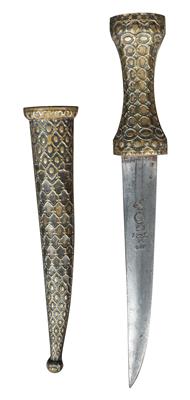Turkey, Ottoman Empire: a dagger of honour, called ‘Enveriye dagger’.

Daggers such as these were awarded to deserving Turkish and German officers as honorary gifts during the First World War – between 1914 and 1918 – by the Turkish War Minister Enver Pasha. Historically it is a very interesting object. Only around 5,000 of these ‘Enveriye daggers’ were produced at the request of former War Minister Enver Pasha (1881–1922) from 1914 onwards, as a personal, honorary gift for deserving Turkish officers (in the whole Ottoman Army there were more than 17,000 ordinary officers and around 7,000 reserves in the officer’s rank). German officers who, in the First World War, were appointed as military advisers in Turkey, were also honoured with such numbered ‘Enveriye daggers’ by the controversial War Minister Enver Pasha (who was also largely responsible for the Armenian Genocide).
The present, rare ‘Enveriye dagger’ is, with its blade, hilt, sheath and decor, modelled after an old type of oriental ‘Khanjar’ and is very well preserved (only the oval closing plate at the end of the handle is missing). The slightly curved, almost straight blade displays engravings in Arabic script on both sides. On one side the Islamic profession of faith ‘shahada’ is engraved (‘there is no god but Allah and Mohammed is his prophet’). On the other side, from the top to the bottom, is the ‘tughra’ (seal of the Sultan) of the then ruling Sultan Mehmed V (1944–1918) above a crescent moon and star. Beneath that is the so-called Rumi year: 1334=1918. Beneath that is the sequential number of each ‘Enveriye dagger’ that had been awarded as a symbol of honour in that year of the war: 584. The same number can also be read on the brass holster on the sheath of the dagger. Hilt and sheath are covered in sheet brass and decorated in an old oriental style. Historically this is an extremely interesting piece and is in very good condition. No significant damage.
Length: 35 cm. (ME)
Provenance:
Austrian private collection.
Expert: Prof. Erwin Melchardt
 Prof. Erwin Melchardt
Prof. Erwin Melchardt
+43-1-515 60-465
erwin.melchardt@dorotheum.at
20.02.2017 - 14:00
- Dosažená cena: **
-
EUR 625,-
- Vyvolávací cena:
-
EUR 500,-
Turkey, Ottoman Empire: a dagger of honour, called ‘Enveriye dagger’.
Daggers such as these were awarded to deserving Turkish and German officers as honorary gifts during the First World War – between 1914 and 1918 – by the Turkish War Minister Enver Pasha. Historically it is a very interesting object. Only around 5,000 of these ‘Enveriye daggers’ were produced at the request of former War Minister Enver Pasha (1881–1922) from 1914 onwards, as a personal, honorary gift for deserving Turkish officers (in the whole Ottoman Army there were more than 17,000 ordinary officers and around 7,000 reserves in the officer’s rank). German officers who, in the First World War, were appointed as military advisers in Turkey, were also honoured with such numbered ‘Enveriye daggers’ by the controversial War Minister Enver Pasha (who was also largely responsible for the Armenian Genocide).
The present, rare ‘Enveriye dagger’ is, with its blade, hilt, sheath and decor, modelled after an old type of oriental ‘Khanjar’ and is very well preserved (only the oval closing plate at the end of the handle is missing). The slightly curved, almost straight blade displays engravings in Arabic script on both sides. On one side the Islamic profession of faith ‘shahada’ is engraved (‘there is no god but Allah and Mohammed is his prophet’). On the other side, from the top to the bottom, is the ‘tughra’ (seal of the Sultan) of the then ruling Sultan Mehmed V (1944–1918) above a crescent moon and star. Beneath that is the so-called Rumi year: 1334=1918. Beneath that is the sequential number of each ‘Enveriye dagger’ that had been awarded as a symbol of honour in that year of the war: 584. The same number can also be read on the brass holster on the sheath of the dagger. Hilt and sheath are covered in sheet brass and decorated in an old oriental style. Historically this is an extremely interesting piece and is in very good condition. No significant damage.
Length: 35 cm. (ME)
Provenance:
Austrian private collection.
Expert: Prof. Erwin Melchardt
 Prof. Erwin Melchardt
Prof. Erwin Melchardt
+43-1-515 60-465
erwin.melchardt@dorotheum.at
|
Horká linka kupujících
Po-Pá: 10.00 - 17.00
kundendienst@dorotheum.at +43 1 515 60 200 |
| Aukce: | Mimoevropské a domorodé umění |
| Typ aukce: | Salónní aukce |
| Datum: | 20.02.2017 - 14:00 |
| Místo konání aukce: | Wien | Palais Dorotheum |
| Prohlídka: | 11.02. - 20.02.2017 |
** Kupní cena vč. poplatku kupujícího a DPH
Není již možné podávat příkazy ke koupi přes internet. Aukce se právě připravuje resp. byla již uskutečněna.
